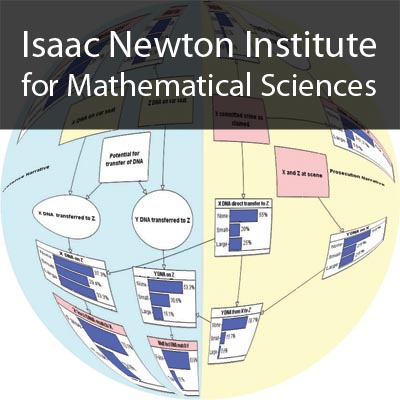Inference platform for Ancestry Informative Markers
23 mins 17 secs,
42.61 MB,
MP3
44100 Hz,
249.87 kbits/sec
Share this media item:
Embed this media item:
Embed this media item:
About this item

| Description: |
Torben Tvedebrink
Wednesday 9th November 2016 - 12:30 to 13:00 |
|---|
| Created: | 2016-11-11 16:01 |
|---|---|
| Collection: | Probability and Statistics in Forensic Science |
| Publisher: | Isaac Newton Institute |
| Copyright: | Torben Tvedebrink |
| Language: | eng (English) |
| Distribution: |
World
|
| Explicit content: | No |
| Aspect Ratio: | 16:9 |
| Screencast: | No |
| Bumper: | UCS Default |
| Trailer: | UCS Default |
| Abstract: | Co-authors: Poul Svante Eriksen (Aalborg University), Helle Smidt Mogensen (University of Copenhagen), Niels Morling (University of Copenhagen)
In this talk I will present a platform for making inference about Ancestry Informative Markers (AIMs), which are a panel of SNP markers used in forensic genetics to infer the population origin of a given DNA profile. Several research groups have proposed such AIM panels, each with a specific objective in mind. Some were designed to discriminate between closely related ethnic groups whereas other focus on larger distances (more remotely located populations). This talk is not about selecting markers or populations for testing. The focus will be about how to provide forensic geneticists with a tool that can be used to infer the most likely population(s) of a given DNA profile. By the use of R (www.r-project.org) and Shiny (web applications framework for R, RStudio) I have developed a platform that provides the numerical and visual output necessary for the geneticist to analyse and report the genetic evidence. In the talk I will discuss the evidential weight in this situation and uncertainties in population frequencies. As the database of populations is not exhaustive, there is no guarantee that there exists a \textsl{relevant} population in the database, where \textsl{relevant} means a population sufficiently close to the \textsl{true} population. We derive a database score specific for each DNA profile and use this score to assess the relevance of the database relative to the DNA profile. |
|---|---|
Available Formats
| Format | Quality | Bitrate | Size | |||
|---|---|---|---|---|---|---|
| MPEG-4 Video | 640x360 | 1.92 Mbits/sec | 336.11 MB | View | Download | |
| WebM | 640x360 | 514.75 kbits/sec | 87.78 MB | View | Download | |
| iPod Video | 480x270 | 522.21 kbits/sec | 88.99 MB | View | Download | |
| MP3 * | 44100 Hz | 249.87 kbits/sec | 42.61 MB | Listen | Download | |
| Auto | (Allows browser to choose a format it supports) | |||||

